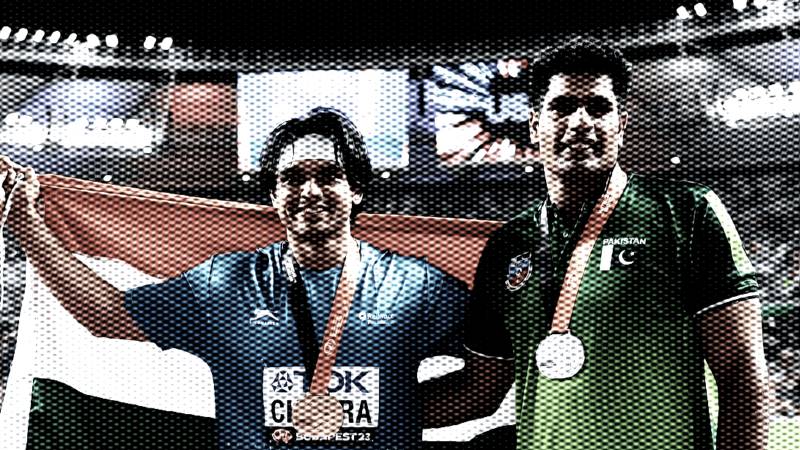
Olympic gold medalist, Arshad Nadeem was born and brought up in the typically idyllic, rural setting, i.e., village No. 101-L in Mian Channu - an unusual name that betrays a "settler" past from colonial times but was probably a name that was likely given by cartographer in the early 20th century than the same having any historical significance. The Partition of Punjab in 1947 left no option for Arshad's grandfather and his clan, Sukhera, to migrate, leaving behind a prosperous and comfortable life in Beghar village in rural Eastern Punjab (now Haryana), Tehsil Fatehabad, district Hisar. His record-setting 92.97-metre javelin throw earned Pakistan its first-ever gold medal in an individual sport. Arshad, though, secured his medal by beating archrival, Neeraj Chopra of India. Despite their rivalry, the two exchanged congratulations and smiles after the event.
Hailing from Karnal (present-day Haryana), his archrival but now close friend, Neeraj Chopra, was as effusive in praises for Arshad as the whole of Pakistan over the latter's new Olympic record. His mother, Saroj Devi, in her endearing Haryanvi lilt, alluded to the fact that in Arshad, the world saw another son of Haryana. Her affectionate congratulatory television interviews not only won millions of Pakistani hearts but also had a quaintly calming effect on the otherwise Pakistan-hating Indian social media.
Saroj Devi's motherly intonations quietly but confidently put up the mirror before hate mongers on both sides of the border by saying between the lines, 'For God's sake, don't wreck the lives of nearly two billion people'. How gracious of her that when she claims Arshad to be like her own son, she is counting the Olympian from Pakistan to be a Haryana boy.
It has to be said that the Indian response (the public reaction rather than official state response) to Arshad Nadeem's victory has served as a breath of fresh air, considering the venom and bile which is on show whenever both neighbours play each other in cricket
Congratulatory messaging from India and, in particular, from Neeraj Chopra's parents can be seen as a clear and strong rebuff to the politics of hate so often practised by leaders like Mohan Lal Khattar, the former chief minister of Haryana, whose needless and hurtful outbursts regarding beef eating is still fresh in the minds of most peace-loving people living on both sides of the Radcliffe Line in India and Pakistan.
Similarly, the Pakistani public's reciprocity of love through the media is giving out an invariably loud and clear message: there is no option but to work for peaceful and friendly co-existence. The fact of the matter is, unlike India, where Pakistan has been the number one election issue for decades and counting, despite the former's steadily rising regional and international standing mainly due to its economic muscle, India is way down the pecking order during general election hustings here in Pakistan.
Like in India, a large majority of Pakistanis do not believe in the politics of hate, with hardly any support for attacks such as that of Uri, which happened days after Prime Minister Modi's impromptu visit to Lahore to meet Nawaz Sharif in 2016. It has to be said that the Indian response (the public reaction rather than official state response) to Arshad Nadeem's victory has served as a breath of fresh air, considering the venom and bile which is on show whenever both neighbours play each other in a cricket match in an ICC-organised tournament.
If General Ziaul Haq, a military dictator of yester years, could coin and embark upon the clever concept of 'cricket diplomacy', the current administrations in Islamabad and New Delhi should seize on this rare moment of shared sporting pride and demonstrate the requisite diplomatic perspicacity by initiating a much needed thawing process. Bringing together two Haryana families by facilitating their travels to Pakistan and vice versa to India could well serve as the first drop of rain towards starting people-to-people contact. 'Javelin Diplomacy' is the need of the hour.

